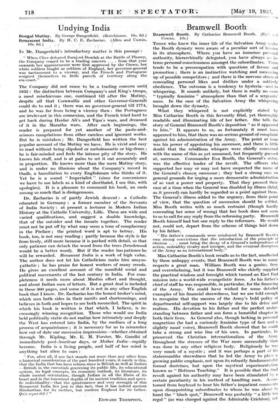Undying India
IN Mr. Dangerfield's introductory matter is this passage : " When Clive defeated Surai-ed-Dowlah at the Battle of Plassey, the Company ceased to be a trading concern . . . from that year onwards her appointments were firiat approved by the Crown, her white soldiers fought as soldiers of England, her governor-general- was tantamount to a viceroy, and the French and Portuguese resigned themselves to little parcels of territory along the sea-coast."
The Company did not cease to be a trading concern until. 1833: the distinction between Company's and King's troops,, a most mischievous one, continued till after the MutinY, despite all that Cornwallis and other Governor-Generali could do to end it ; there was no governor-general till 1774, and he was far from being a viceroy then : the Portuguese
are irrelevant in this connexion, and the French tried hard to get back during Ilaidar Ali's and Tipu's wars, and dreamed of it in the Maratha wars. After such beginnings, the reader is prepared for yet , another of _the paste-and- scissors compilations from other careless and ignorant works. But he is mistaken ; Mr. Dangerfield has written the best popular account of the Mutiny we have. He is vivid and easy to read without being slipshod or melodramatic or big-drum ; he is fair-minded and feels the intense pity of the story. He knows his stuff, and is at pains to set it out accurately and in proportion. He knows more than the mere Mutiny story, and is under no illusions about the Company's record in Oudh, a humiliation to every Englishman who thinks of it.
Yet he is a sound " Imperialist " (since for convenience we have to use labels as a kind of shorthand, I use this, with apologies). It is a pleasure to commend his book, an oasis among so much that is disingenuous.
Dr. Zacharias is of partly Jewish descent : a Catholic educated in Germany : a former member of the Servants of India Society : at present a lecturer in Modern Indian History at the Catholic University, Lille. These are wide and varied qualifications, and , suggest a double knowledge, that of the outsider and the inmate together. The reader must not be put off by what may seem a tone of complacency in the Preface ; the printed word is apt to betray. His book, too, is not easy reading ; partly because the style is far from lively, still more because it is packed with detail, so that only patience can detach the wood from the trees (brushwood would be a better word). But if the reader has patience he
will be rewarded. Renascent India is a work of high value. The author does not let his Catholicism make him unsym-
pathetic ; he has praise for honest workers of many creeds. He gives an excellent account of the manifold social and political movements of the last century in India. For com-
pleteness it needs more about Muslim effort and thought, and about Indian men of letters. But a great deal is included
in these 300 pages, and some of it is not in any other English book that I know. Dr. Zacharias has the honest broker's mind, which sees both sides in their merits and shortcomings, and believes in both and hopes to see both reconciled. The spirit in which his book is written is that which, I believe, is in- creasingly winning recognition. Those who would see India held politically static do not realize how intimately and deeply
the West has entered into India, by the medium of a long process of acquaintance ; it is necessary for us to remember how out of date our successive impressions—whether obtained through Mr. Kipling, Mr. E. M. Forster, Mr. Gandhi of immediately post-Amritsar days, or Mother India—rapidly become. India is a living people, and half of her mind is anything but alien to ours : " For, after all, if one fact stands out more than any other from a historical consideration of the past hundred years, it, stirely is this, that the India that has been reborn since is British as well as Indian —British in the essentials governing its public life, its educational system, its legal concepts, its economic outlook, its literature, its whole mental orientation, though Iiidian in all the fibres of its heart and in the innermost depths of its ancient tradition and speci- fic individuality—that the quintessence and very strength of this Renascent India lies just in this fact, that it has indeed ancient Hindusthan for its mother, but modern England for its father. Quis separabit 1".
EDWARD THOMPSON.














































 Previous page
Previous page